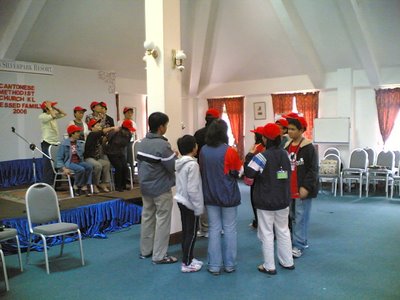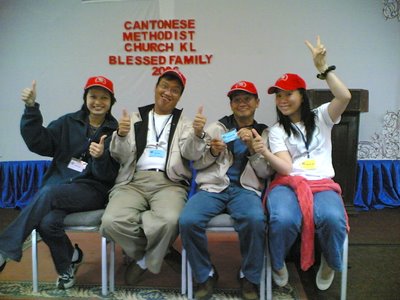
We just had our church family camp and I have not been posting for several days. These posts are pre-dated with some interesting stuff I have learnt at camp.
Theme: Blessed Family
Sub Theme: Experiencing the Faith and Expanding God’s Kingdom
Some highlights:
The Passover Meal and the Last Supper
When the Israelites have their annual Passover Meal to commemorate the saving act of God, they would toast each other with red wine with a total number of 4 toasts. The last toast is “that we will meet next year in Jerusalem” upon the hope that the Messiah would have came and all Jews would return to Jerusalem for the realisation of the Kingdom of God. In contrast, during the Last Supper, Jesus said something similar but with a significant difference:
Matthew 26:29 I tell you, I will not drink of this fruit of the vine from now on until that day when I drink it anew with you in my Father's kingdom."
Lesson: In Christ we have the hope, we have life, in which we look forward to that day we partake in the meal anew with him in heaven. How we all should look forward to it!
The Endings of the 4 Gospels
Morna Hooker, a British theologian and New Testament scholar has written several books including Beginnings: Keys that open the gospels (1997) and Endings: Invitations to discipleship (2003). The speaker introduced us to her Endings book and led us to the lessons we can learn from the endings of the 4 gospels. In brief:
Matthew and Mark: The 2 Mary’s went to the tomb bringing spices and myrrh but the stone was moved, Jesus is not to be found. But they met an angel who told them to go and tell the disciples that Jesus has risen, He is not here. In fear, the women went knowing that no one will believe them being women, who were not seen to be reliable witnesses at that time but they obeyed.
Luke: The road back to Emmaus passage reminds us that our lives in Christ is not a disappointing one but one full of hope. Even when things seem bleak, He is alive. The mention of breaking of bread, where the 2 disciples suddenly realised who they are with, reminds us that even though bread and wine is common fare but they are with profound meaning.
John: The ending of John should start from chapter 20 right up to 21. Here we see the disciples including doubting Thomas who is representative of all of us – many times, we fear, we doubt. But we can have his peace and his comfort which only a living God can give us. And with Peter, who denied Jesus 3 times by this time, have become the disappointed Peter who would be deeply disappointed with himself. But Jesus strengthened and reaffirmed him by giving him the opportunity to turn his 3 denials into 3 commitments of love.
Lesson: Our faith and belief is not only in our mind but in our lives – we are to live it out. The end of the gospels comes the Great Commission. After experiencing the faith, we are to spread the faith.
John Wesley’s Example
Through his 5 contributions/traditions in his mission work:
1. Dynamics to Preach: he is one of the preachers who started “open air” preaching, taking preaching out of the church into the common places, as long as there are people, there will be preaching. He is known to have preached in the mines as well as standing on top of his father’s grave.
2. Small Groups: he is not the first person to start small groups but one of them who strongly practiced it up to the point that if a person is not a member of a small group, he is not a member of the church. Within these small groups many things are possible where in a large church it is not: encouragement, reminders, closeness.
3. Social Righteousness: the fervency of faith needs to be brought to the society. Piety involves caring for the needy. We need to live a holy life in this secular world. (Wesley in his last and final letter before he passed on is a letter written to William Wilberforce (1791) encouraging him to be steadfast in getting slavery abolished, which is finally realised not only in the UK but also in America.)
4. Hymns: John and Charles Wesley make a very good team. John was an excellent preacher and Charles was an excellent poet. Charles converts John’s messages into hymns, when sung will allow the people to put them into memory and as a result their faith became strengthened. In addition, when sung to one another, they are also being reminded of the faith. Interestingly, John Wesley even have his 5 singing rules, check it out here.
5. Dynamic Spirituality: Jesus said, “I am the vine and you are the branches.”
Which type of Christian are you?
1. The life buoy: Throw it to me when I am in distress … otherwise keep it hanging there.
2. The diet: I will do it … tomorrow.
3. The pillow: I do need it but if I don’t have it, I’ll still be okay.
4. The clock: I am steady and normal, ticking as expected as I go.
5. The remote: Keep changing the channel until I get what I want.
6. The thermometer: I go up and down according to my surroundings
7. The thermostat: I am set by my master and I will be what I am to be, regardless of what goes on around me.
The Emphasis of the 4 Gospels
What differentiates the gospels? In Mark, Jesus is seen in vocalising his teachings and displaying his acts including healing, driving out of demons and in doing so proving that he is the Messiah as stated in the Old Testament. Matthew is similar to Mark but grouped messages together. In Luke is where there are many stories told, some of which are not found in the other 3 gospels, e,g, the parable of the prodigal son. Luke has set down what Jesus has done chronologically. And as far as John is concerned, its profound introduction is enough to place it as one of the most unique books in the bible.
Each of the gospel has a different emphasis. What are they? Hooker brings out the emphasis by looking at the endings of the gospels.
Mark
Mark has 16 chapters. In the middle of the book, in chapter 8, we can see there a turning point in the story of Jesus. Jesus and the disciples had gone to Caesarea Philippi, a place well-known for idolatry. It is here that Jesus asked his disciples “who do you think I am” after they have been following him for 2 years. Peter answered him, “you are the Christ”. And from then on, Jesus began to clearly tell them about his going to Jerusalem and dying for them.
If you take a look at the last chapter of Mark in your bible, there should be a note stating that more reliable manuscripts do not have verse 9 to 20. Some commentators suggested that the gospel does do well without these verses, which means that there is no problem with the gospel ending in v.8, Trembling and bewildered, the women went out and fled from the tomb. They said nothing to anyone, because they were afraid.
How so? Mark was written in a time of persecution. It was suggested that it could be a tactical way for the writer to impress upon the readers that you can never not go and tell about Christ.
Emphasis: How can you not tell?
Matthew
Matthew is very systematically grouped. There is this passage where Matthew grouped 5 what-Jesus-did-and-what-he-said. The 6th time however, Matthew told of what Jesus did – he died on the cross. And following, Jesus did not say much but that believers must obey all that he has commanded.
The emphasis in the whole book of Matthew is discipleship. Take a look at Matthew 28:19:
Therefore go and make disciples of all nations, baptizing them in the name of the Father and of the Son and of the Holy Spirit.
In the English translation, the strongest verb seems to be “Go!” But in Greek, go is a particple while make disciples is an imperative. As such it should read something like: Going therefore, make disciples of all nations.
Emphasis: Make disciples!
John
John has recorded this of Jesus, that he has said, “how I preached, you preach also. As the Father have sent me, so I have sent you.”
There are 2 Greek words used for miracles, dunamis and simeon. The second word is used here in John, as signs to who Jesus really is – the Son of God. For example, the first miracle of turning water into wine. The water being turn into wine gives a very clear message that the cleansing that they have been practicing is not enough. Wine, in the OT represent the coming of the Messiah, which also Jesus symbolically used it representing his blood. Signifying that only through Jesus that one can be saved.
I am quite awed at how the speaker puts the emphasis of John.
Emphasis: We need to be the word, and the word must become flesh.
Luke
The gospel of Luke can be taken in 2 parts – part 2 being the book of Acts. The emphasis is clearly the breakthrough of the gospel of Christ beyond geographical borders, cultures, races.
Emphasis: We must preach the good news, we must have a vision, a breakthrough.
Some Fraser's Hill and camp pictures
Top: the evening sky - notice the unique light effects. Too bad I couldn't quite capture it with my phone camera.

A close up of the light effects

The skies and hills in Fraser's Hill on a foggy evening (or was that my "foggy" camera? lol)

Another view from our apartment unit

Silverpark Resort apartments

A downward view from the balcony

Some campers getting ready to take group pictures in the main hall

Here we are - a small portion of our church music and worship team who attended the camp. I am on the far right :)

My son and I
Maeghan
updated on 7th June 2006

Maghan,
ReplyDeleteTalk about some great pics! Where do you get time to write all of this? There are some great nuggets in here.
Our faith and belief is not only in our mind but in our lives – we are to live it out.
Amen, this is so true. Thanks for articulating it. I just wanted to shout 'That's exactly right!'
Thanks for sharing.
I have a question about Malaysia. Isn't it predominantly Muslim? How are Christians received there? I'm just an ignorant American who is curious.
God Bless
Doug
Where do you get time to write all of this?
ReplyDeleteI have taken notes (with a real pen and a real notebook :) during the camp. Then I took time during lunch today to transfer them into this post. I am just about to start on notes of the Day 3 talk.
About Malaysia: we are a country predominantly Muslim but the others are allowed to freely practice their religions; however, with some slight prohibitions. You might want to check this out, I scanned it through and find it quite a good summary of Religious Tolerance in Malaysia.
I'm just an ignorant American who is curious.
Aren't we all :)
I am not American, but I am just as ignorant and curious. I was only enlightened when I asked someone about the Enlightenment period when I was at the camp. I was reading a book that mentioned it by passing. I obviously could not continue reading, not until I get my limited knowledge on history updated again. My generation lost a lot when World History was taken out of our school syllabus during our time. I hope it is back on now.
I love the picture of you & your son!!!
ReplyDeletemaeghan,
ReplyDeleteThanks for the wiki link. This worries me more than anything. In the U.S., our rules one witnessing are not too bad but apathy is a bigger enemy than government. It kind of reminds me of an old Keith Green song.
Jesus rose from the dead,
And you can't even get out of bed.
Thanks for the great stuff.
God Bless
Doug
Julia,
ReplyDelete:) Thanks - I really like it too and since you kinda know that I am not too good with pictures!
Doug,
ReplyDeleteOur church leaders keep reminding us that it is through persecution that we stand strong in the Lord. Comfort and contentment brings us to apathy, which as you said, is indeed worrying.
Reminds me of this verse.
Not only so, but we also rejoice in our sufferings, because we know that suffering produces perseverance; perseverance, character; and character, hope.
Romans 5:3-4
Looks like we will going into Romans 5 this June 20, it is time I dig into this chapter.
I never heard of that song before. Will definite share that line with my son - he will find it amusing! haha ... and maybe with the late comers on Sunday morning!!!
God bless!